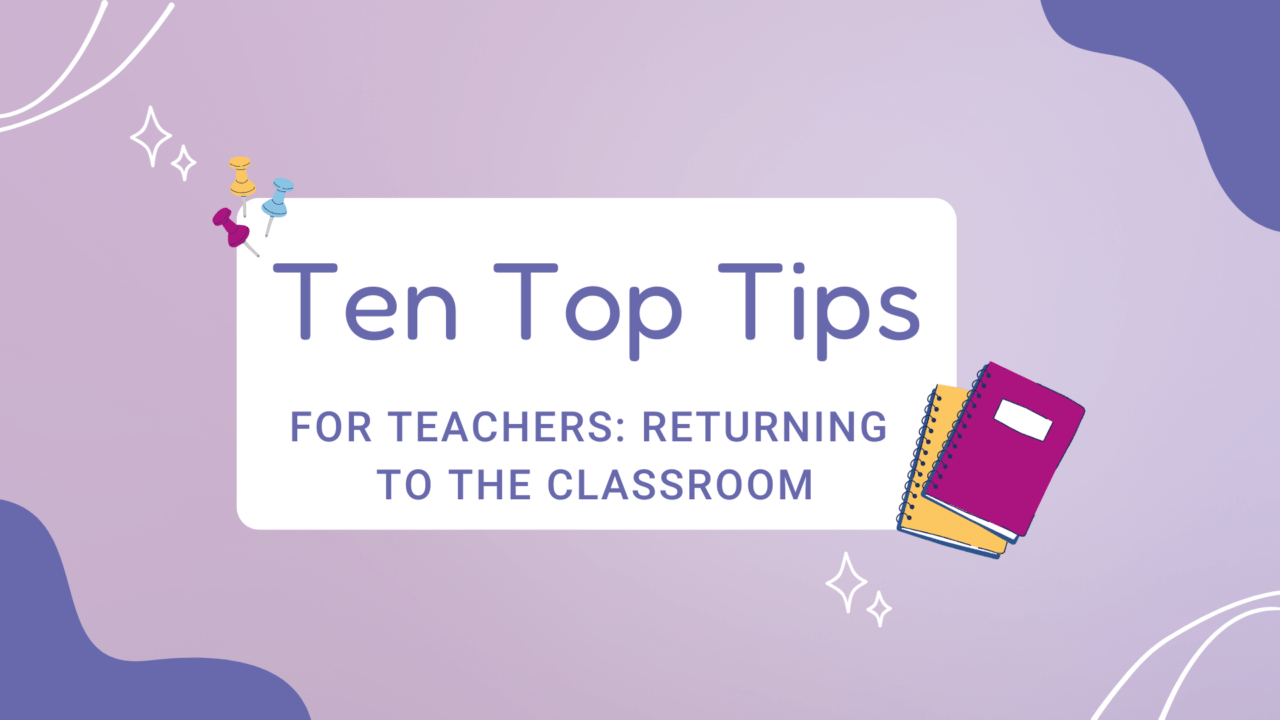Whether you are an ECT and buzzing for your first every class, or an experience teacher excited to start the new year, these top tips will help you have a smooth start to the year!
Top Tips for Teachers: Returning to the Classroom


1. Sit ANYWHERE!

Teachers don’t often like to let their students sit anywhere in the classroom, but trust me! This is a good teacher hack! At first, your students might be quiet in the classroom trying to get used to their new environment; however, their personalities will show very quickly. You will learn who are good friends, who are good role models and who should kept apart because they are a bit too distracting or easily distracted. This will help you map out your seating plans for different lesson, as well as allowing you to spot children you need to focus on for social and emotional wellbeing and modelling. Let them sit anywhere and you will learn a lot about your students!
2. Be known to the Parents
 Now, this may sound obvious and you may be thinking “of course they know I’m their child’s class teacher”, but could you guarantee the parents could single you out of all the staff in your school? Be present on the playground when possible when the children are arriving. Give the parents a quick smile and wave. The parents will appreciate this and acknowledge you. This allows a better rapport with parents and they are more likely to trust you and open up to you (rather than complain to someone else) if an issue arises. Be proactive and be known to the parents!
Now, this may sound obvious and you may be thinking “of course they know I’m their child’s class teacher”, but could you guarantee the parents could single you out of all the staff in your school? Be present on the playground when possible when the children are arriving. Give the parents a quick smile and wave. The parents will appreciate this and acknowledge you. This allows a better rapport with parents and they are more likely to trust you and open up to you (rather than complain to someone else) if an issue arises. Be proactive and be known to the parents!
3. Great Communication!

Let’s focus on communicating with parents! Now, you are probably thinking “oh but I do contact the parents if there is a problem”. But there is my issue. We teachers have a tendency to only contact parents if there is an issue and this can set up a negative atmosphere and make parents anxious about seeing the school’s phone number on their mobile. You need to make sure that you not only contact parents for the negatives but the positives too! Parents love it when you can contact them about a positive thing their child has done that day. You could do this via a phone call, a messaging service (such as Seesaw or Class Dojo), mini certificate or star of the week. Do what works for you and follows your school policy. If you do one great thing this year, make sure you have great communication!
4. Get to Know You Activities
 This is a nice simple one. We are used to using these kind of activities on transition day before the summer holidays when you meet your new class. But sometimes, children are very shy and quiet and apprehensive during these sessions. I have found, in my years of teaching, that continuing these activities as mini lessons or filler activities in the first couple of weeks back to school really help encourage communication in class and really allow you to get to know the true student personalities. Help children break out of their comfort zone and allow yourself to have an easy way to learn about your children. You can use some of the activities for an easy display too!
This is a nice simple one. We are used to using these kind of activities on transition day before the summer holidays when you meet your new class. But sometimes, children are very shy and quiet and apprehensive during these sessions. I have found, in my years of teaching, that continuing these activities as mini lessons or filler activities in the first couple of weeks back to school really help encourage communication in class and really allow you to get to know the true student personalities. Help children break out of their comfort zone and allow yourself to have an easy way to learn about your children. You can use some of the activities for an easy display too!
5. One Day at a Time

This is so, so, soooo important! I’m going to be 100% honest. Teaching is HARD. Teaching is TIRING. Teaching is EXHAUSTING: mentally, physically AND emotionally! We go through all of it so making sure we take it one step at a time, one day at a time is imperative to good mental health. We cannot change the past but we CAN plan for the future. Don’t hang onto the “what if…” or “that did not go to plan…”. Think about what you can do for the future and remember, there are so many resources available (including staff) at your school that you can use to help you take it one day at a time. It is okay to ask for help!
6. Clean Slate
 What is a clean slate you may ask? Well, to me, a clean slate means giving every single child a fresh start in your classroom. Even if you have been told that you have children in your class that are “troublemakers”, “liars” or “naughty”, make sure you give them a brand new, fresh start. If you start the year thinking negatively about the children, you are not giving them a chance to learn and change. Children misbehave for a reason! Try and find out what that reason is and teach them that open communication is alright. Be the person they feel safe talking to. Once the children feel comfortable talking to you and know you will not judge them for previous years, they will open up, focus and learn. Put in the work and give the children a clean slate!
What is a clean slate you may ask? Well, to me, a clean slate means giving every single child a fresh start in your classroom. Even if you have been told that you have children in your class that are “troublemakers”, “liars” or “naughty”, make sure you give them a brand new, fresh start. If you start the year thinking negatively about the children, you are not giving them a chance to learn and change. Children misbehave for a reason! Try and find out what that reason is and teach them that open communication is alright. Be the person they feel safe talking to. Once the children feel comfortable talking to you and know you will not judge them for previous years, they will open up, focus and learn. Put in the work and give the children a clean slate!
7. Smile Boards

I LOVE a smile board! What are they? Let me explain… Every single year I use a smile board in my classroom. It is a great way to recognise children and match their faces to their names. A smile board starts off with their first day in your class photo with their name below. Of course, make sure the children have photo permission! If they do not have photo permission, consider calling the parents to see if they will allow this picture. If not, have the children either draw their portrait or something that represents them and put it up so no one is left out. Do this also for any children that do not feel comfortable with their image up in the classroom. As the year goes on, you can update the board with new photos you have taken during trips or activities. The children love seeing the board and it makes it so easy for new staff in the room, child communication and your own member (we have to learn a LOT of names).
8. Staff Rapport
 This probably sounds obvious. You know you have to be professional and have good social skills with those you work with (even if you don’t particularly get along). What I am talking about is your own social wellbeing and mental health. Too many times I skipped my break or lunch and got lost in the world that is my classroom. Remember to go to the staffroom and join in conversations and actually TAKE YOUR BREAK! Your classroom will still be there when you return. Make sure you talk to a range of staff, not just teachers. You may meet your new best friend in a department you don’t speak to often.
This probably sounds obvious. You know you have to be professional and have good social skills with those you work with (even if you don’t particularly get along). What I am talking about is your own social wellbeing and mental health. Too many times I skipped my break or lunch and got lost in the world that is my classroom. Remember to go to the staffroom and join in conversations and actually TAKE YOUR BREAK! Your classroom will still be there when you return. Make sure you talk to a range of staff, not just teachers. You may meet your new best friend in a department you don’t speak to often.
9. Support Staff

Here I am going to focus on Teaching Assistants/Learning Support Assistants/1:1 Adults. Support staff are absolutely amazing and you are so fortunate if you have one in your class. They are eager to support you and the children and complete tasks enthusiastically. They will also keep you sane during the day! Make sure you give clear directions and guidance to your support staff (remember some may be new) and make sure you thank them. Of course, it is their job to help you and the children but, from my experience, support staff tend to go above and beyond their roles. Make sure you recognise their hard work and maybe get them a chocolate every now and then!
10. Be Reflective
This is drummed into us during our teacher training but it is imperative. If you can’t reflect on your work, lessons, planning or activities you will never progress your teaching or progress in your career. You need to be a reflective practitioner. Reflect (look back on/over) the activity you have just completed. What went well? What could have been better? What will you change for the next time? Being a reflective teacher will help model to the children how to be reflective and you will see them become reflective learners and make progress independently on their own work. Make sure, as a class, you reflect back on your week on a Friday to model this skill.

